Dreams to Come: Where is Serena Going From Here?
We've all met her. She'll call you crying, recounting her last fight with her boyfriend. He'd drink, storm out, then come home smelling like another woman. She'd have her life planned out, the exact shade of white for their picket fence, her career, and their kids' names. If she could only do better, get him to stop drinking, and prove her worth. You'd tell her to hit the road and find a place of her own. She'd be so much happier with someone else, or with nobody at all. She didn't need him. She'd agree, nod along, and talk about how it probably would be better if he was out of her life. Then his carlights would show up in her driveway, and she'd have to go. She'd hang up, fight some more, and call you the next evening, ready to tell you what happened when he got home from the bar.
Who are we to blame someone like that? The best of us have entered into a toxic relationship, and bad love is so hard to walk away from. It might be irritating, getting those calls every night, urging your friend to leave. But it's human nature. We develop a sense of loyalty towards those who treat us the worst. But what if she was a terrible person? A slave owner or the philosophical founder of a theocratic regime, and you were her handmaid or her martha, offering her a drink late at night, or withstanding a visit from her in your room? Would you still feel bad if her husband was abusive? Would it sting just as much seeing her beaten and yelled at? From a detached perspective, it's easy to say that it wouldn't, but in Gilead all women are second-class citizens--subhuman, seen as stupid and frivolous. They have no choice when it comes to their future or their circumstances, even as wives. There's no such thing as bodily autonomy. What he wants, he gets, whether she wants it herself or not; that's the case in the bedroom, in the kitchen--in every aspect of life, and abuse is the norm. That's on top of a long list of societal prejudices and pseudo-scientific biases, destroying their self-confidence and forcing them to accept that they are in fact inferior.
How do you look at a wife, even one as cruel as Serena, and not feel a flash of pity? We could say that we wouldn't, but if we were face to face with that level of oppression, things could get complicated. We are talking about someone who wasn't allowed to read or write. She had duties to perform. Her free time was confined to a short menu of government-approved activities, and she wouldn't be allowed to leave--even after years of infidelity and beatings. In truth, wives are slaves just like handmaids and marthas. They're trapped and forced to work. They're monitored and belittled. They're certainly not protected. Guardians could hurt them. Their husbands treated them like property. Just like with Rita, someone could've cracked Serena's jaw and nobody would have even flinched.
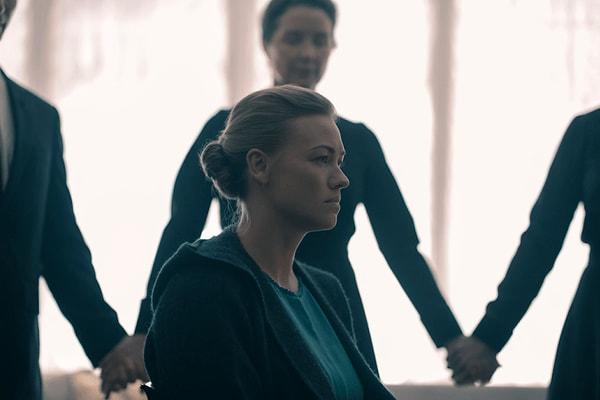
Courtesy of Hulu
This was the moral conundrum June found herself in, and she took the high ground. Serena was cruel, bitter, and vicious. She didn't care that June was being violated, and she had no problem beating her or threatening her. She saw June as a means to an end--a vessel to be filled and then discarded, and she saw fit to make sure June fulfilled her mission by whatever means possible. June saw that, and she suffered because of it. She was confined to her room, assaulted, and berated. She lived under Serena's watchful eye, always struggling to conform to her strict standards. But she also saw a woman that had been robbed of her career, respect, and her position as a famous author, and she knew that Serena resented all of those things. She also realized that women across the country were being treated that way, abused but also blind to that abuse. Who wouldn't want to rub their noses in the truth, force them to see what they were living through, and try to find a way to get them to speak out?
That is how June found herself outside Serena's door after her first beating, asking if there was anything that she could do. June felt for her, and she still felt for her even after everything that had happened. But Serena lives in a narcissistic bubble. Yvonne Strahovski has spoken about it. She could handle the idea of handmaids, marthas, and the colonies because it was 'us' versus 'them.' Those were unwomen, not women of faith who had the privilege of running their own homes, certainly not the wives of the founding fathers of Gilead. They were special. She was special, and so long as the suffering didn't affect her or her loved ones personally, she didn't care about it. The second it crossed into her bubble of arrogance, and she was sitting on the bed whimpering with a map of bruises on her back, then Gilead had gone too far. We saw this with Nichole, when June declared that she wouldn't be allowed to read God's word, Serena spoke out, not for the women of Gilead, but for her stolen daughter. She was willing to berate her former slave in front of the Lincoln Memorial--even to the point where she told June that she should've had her mutilated--but when Serena was with the Wheelers, all of a sudden, she cared about the plight of handmaids. Time and time again, she's proven herself to be a class-act narcissist.
Whenever she earns our sympathy, whether it's from Fred beating her or her finger getting cut off, she shows us who she is. It's a form of checks and balances. We can never fully like her. She had no problem taking Nichole away, forcing June out of the house before the child was weened. She had June violated to make Nichole come faster. When she finally moved beyond herself and gave Nichole up, she decided to scour the planet and move heaven and earth to get her back. This was after a short period of reflection and remorse, characterized by June pleading with her to help other women in Gilead. Serena didn't care about them, or the fact that their basic human rights had been taken away. She cared about the fact that she missed Nichole, nothing more; even Nichole's safety and rights took a backseat. She does have the ability to make us forget sometimes, but once we take a step back and we see what she's done, we shake our heads and remind ourselves that she is completely irredeemable.
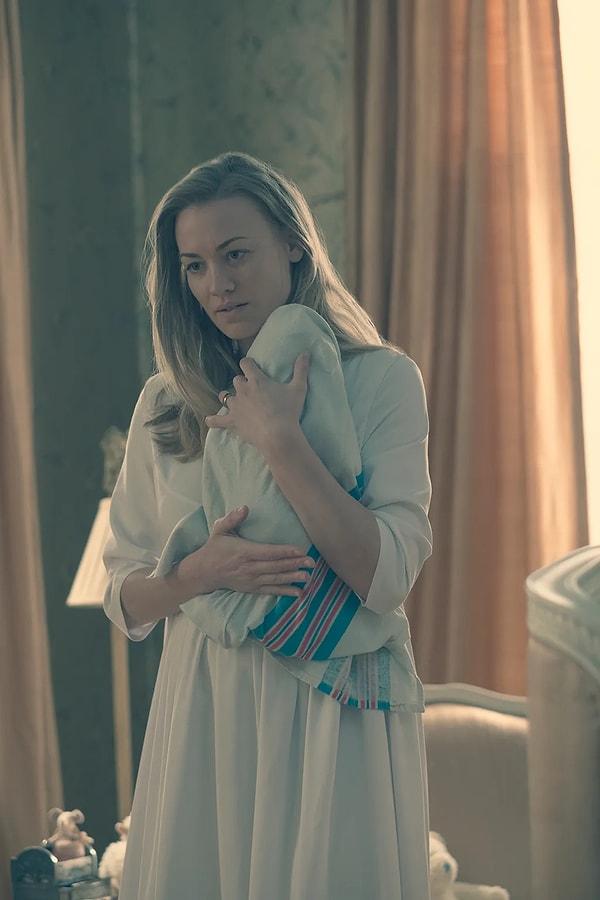
Courtesy of Hulu
Shallow Edge
Serena can be explosive. She can shriek, attack others, pout, and tirade. Sometimes when it happens we want to feel bad; we really do, because she has found herself in some bad situations. She took the role of a grieving wife at the beginning of season five, offering up some of Yvonne's best performances in the series. The second that she found out Fred was dead, her face contorted and she started sobbing. This was all interspersed with flashbacks of them dancing the tango together in Washington DC. What we realized at that moment was that she felt an attachment to him. But she went on--less than a few days later--to talk about how she was glad that Fred was dead, and it was a good thing that he wouldn't be around to raise his child. She was more concerned about how his death and June's violent streak would affect her. Would she be a woman alone? Would Gilead take Noah away? Could June get to her?
Her most emotional moment--forever to be known as the hissy fit to end all hissy fits--was a misguided blame fest that took place in the morgue when she went to identify Fred's body. Ever since she was moved out of the ICC prison, she insisted that Tuello led Fred off to his death. She even added a Biblical reference to Judas for good measure. But in the morgue, she was completely hysterical. She was convinced that June was coming to kill her, and she was right. June had every intention of doing so, and she had the weapon she'd need to do it. Serena was certain that there was nothing that Tuello could do, which was somehow his fault. She tore into him saying, 'don't you dare tell me you can protect me from her.' She then ripped the sheet off of Fred's body saying, 'Take a good look at what she's capable of.'
Fred was missing half of his right side. It was actually kind of satisfying, especially knowing that it was torn off by hand. Tuello didn't even look. He wasn't fazed at all. He had the perfect poker face, and he never once indicated that he planned on protecting Serena. Instead, he told her that she could apply for asylum and refugee resources, which didn't come with a security detail. It was the verbal equivalent of a form letter. He then made a run to June's house to comfort her and thank her for a job well done. The fact that Serena was able to turn the entire thing around, make it about her, and demand some sort of help from someone that she was ready to tear to shreds spoke volumes about her personality. What happened in Gilead was even worse. She made a big show of putting Hannah on every screen in Canada's version of Times Square. She hinted at wanting to marry Commander Lawrence, who would rather drink acid, and she finally settled on becoming a poster child for a country that amputated her pinky finger. She didn't seem conflicted. There was no pause. She was clearly loyal to the Gileadean regime.
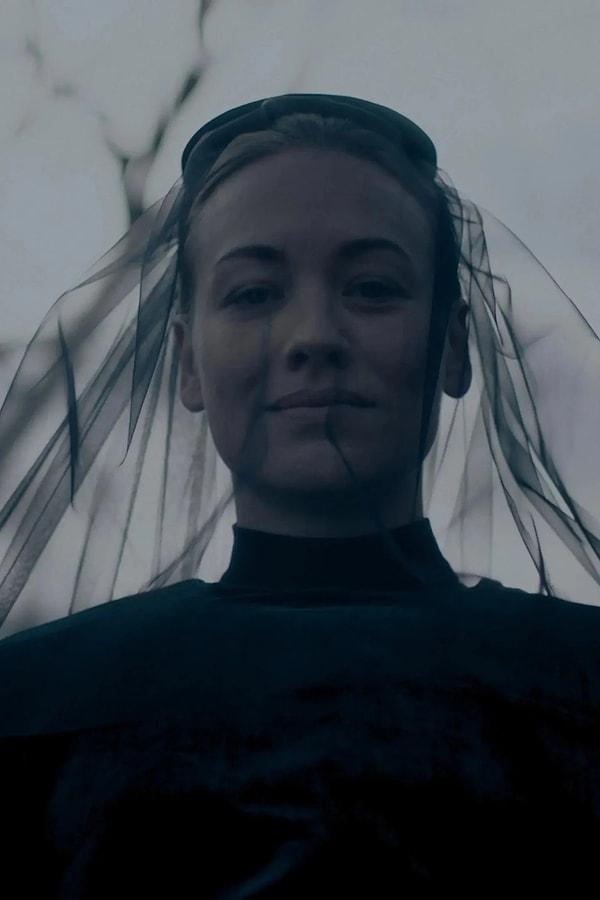
Courtesy of Hulu
We have spent years watching Serena act out this dance. We'd hope and pray that she'd see the light. But once the veil was lifted, it came right back on. At this point. she's surviving off of conscious self-delusion, and it makes no sense whatsoever. Serena is a modern woman, born during a time when Gilead's strange misogyny was long lost and barely understood. Most of her peers didn't even know such mindsets ever existed, and they were not about to accept them. She has no excuse to even consider their validity, and her desire to keep coming back to them over and over again is simply outlandish. We don't fully know what her upbringing was like, but even if her mother was a strong Christian, her views couldn't possibly have been as extreme as Gilead's. So we can't blame lifelong indoctrination. There's no brainwashing, certainly nothing like what we saw at the red center. She's just decided to think like a cavewoman, and no matter what's happened, she won't stop.
The show has made a point to give Serena multiple chances to convert and abandon her country. After Fred beat her, they traveled to Canada, where Tuello told her that she could be on a flight to Honolulu in less than an hour. She mocked him, calling it coconuts and treason, and gave him a cold reception. When she did defect to Canada, it had nothing to do with the abuse she faced or her loyalty towards Gilead. As Rita pointed out, she was only there because she wanted to be close to Nichole.
She did revert back to old habits once she was housed in Canada. She took up writing and reading. She stopped wearing the teal, and she dressed like a modern woman. But like Moira said when she came to drop off Nichole, she was still the same woman that held June down while her husband violated her. She was a gender traitor. She allowed herself those freedoms because they suited her. It was what she wanted to do. It wasn't about rebelling or supporting the rights of others. She was a hypocrite who praised God when people were looking and did what she wanted behind closed doors. This proved something even more nefarious: She developed Gilead's philosophical base, including the idea that women should avoid men's business. Things like public speaking, writing--all of her conference calls and outreach were off-limits to every woman but her. This was pointed out in the novel as well. She oppressed other women, but not herself. She believed in her freedom, but not the freedom of others.

Courtesy of Hulu
Serena's final chance came when she was taken back to Canada after Fred's funeral, something she hadn't prepared for. She wanted to stay in Gilead, where she planned on marrying a commander to raise her son. It was a preposterous idea. Noah would've been brainwashed and brought up to be just like his father, and his indoctrination would've been complete. Unlike Fred, Noah wouldn't have spent time in a modern world, surrounded by modern values. His only reference point for morality would've been Gilead. Serena didn't seem to mind that at all--never mind everything she'd been through and come to realize. She wasn't thinking clearly. Even her safety didn't seem to matter. Tuello went to great pains to point out that Gilead wasn't safe for a woman, especially someone on her own with a child. Serena thought she'd be fine; again, she's special in her mind. She'd find a husband and live the life she'd always wanted to live. But she'd still have the Gileadean justice system to contend with. She'd be barred from reading or writing, and she'd lose her ability to live an independent life. She'd be stuck with whoever she married until one of them died, regardless of who that was or how he treated her.
When Tuello offered her an out--a thoroughly generous chance at refugee status--she refused, preferring instead to be confined to the Gilead Information Center. We have no explanation. We're never told why she has this tendency. There are no clues. She doesn't seem fully brainwashed. There are things about Gilead that she hates--openly so. In many ways her eyes are open, but she can't seem to wrap her mind around the danger aspect. She didn't think how vulnerable she would be in that small building, guarded by some creepy guardian wannabe, and it never seemed to occur to her that she could be mistreated by Gilead's followers in Canada. It was a giant miscalculation, and in many ways, it was beneath her. She should've been smarter than that.
In a sense, it was her fault when things went bad. She wanted to play missionary. She couldn't just move on. She actually thought it would be a good idea to promote the country that had her finger amputated. When Luke threatened to have the building shut down, she was the one who provoked him. She could've done something to help him get Hannah instead. He gave her a choice, and with Serena, it is all about choices and accountability. Her life could've been better. She could've been free, happy, paving a healthy path for Noah. She made things the way they are.
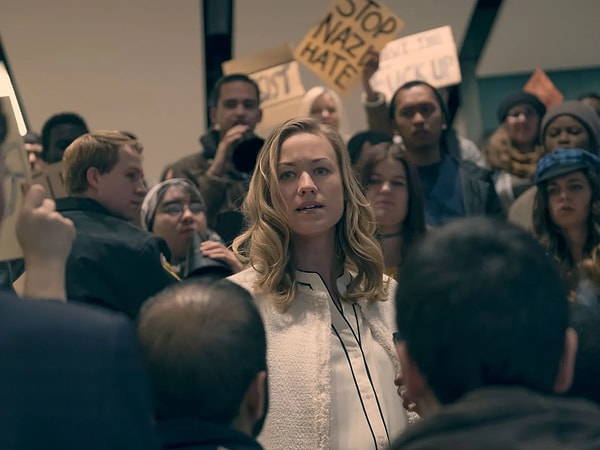
Courtesy of Hulu
Consequences
In retrospect, Serena should've seen the Wheelers coming. Luke had all of the paperwork he needed to have the building shut down, and June was already stalking her, firing her gun into the air. It made sense that she'd be forced out, and she wouldn't have anywhere to go. After all, Serena was warned that she couldn't leave. When she was finally forced out, she'd have to contend with people psychotic enough to support a regime that instituted slavery.
Unlike believers in Gilead, Canadians were still contending with a fertility crisis. They didn't have the handmaid system to counter the falling birth rate--a great source of envy, so they'd have to take whatever they could get. Anyone willing to take in Serena--an author who was clearly shirking Gilead's laws against literacy and domestication--was bound to see her as a sinful woman and an unfit mother. She was naive and sloppy, and she got what she deserved.
The audience should've seen it coming as well. The show's creators laid out the scenario surrounding Noah's birth before it even happened, saying in an interview that Serena deserved to be put in a handmaid-like situation and to have her son ripped from her arms.
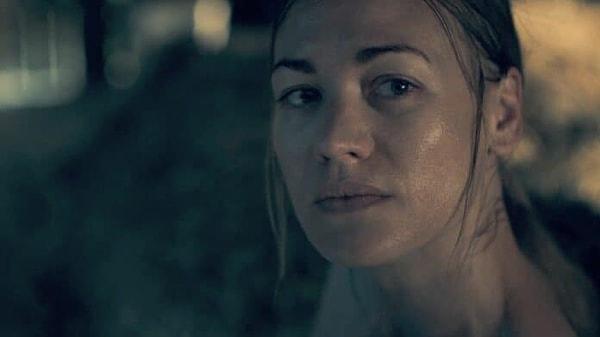
Courtesy of Hulu
What Happens Next
A few hours before June and Serena had their bonding moment in the barn, Serena was fully prepared to kill June. This is something that everyone involved, including the showrunner, have talked about at length. Serena didn't plan her escape from Ezra until she started to go into labor, and she knew that she couldn't give birth under the Wheeler's custody. She did plan to shoot June, and she probably would have done so otherwise. There's been no redemption, no enlightenment. She's still a believer, and she spoke quite a bit about her faith when she was giving birth. That hasn't changed, and it won't.
She's proven to us time and time again, that she will hide behind her beliefs. Even after becoming a handmaid, she still supports the regime. A few minutes before she escaped from the Wheelers, she was talking it up, promoting a nation with a slave-driven economy to a group of potential converts, and she was doing an amazing job of it.
Don't feel pity for her. Yvonne said that Serena doesn't feel bad for anything she has done, and she'd do it again. She was upset about the Wheelers and losing Noah because she was affected, and like Commander Lawrence said, she has an irony deficiency. She doesn't care about handmaids or marthas. She cares about herself. So now that June and Serena are in it together, on a train going west, we can't expect her to be kind or to act in June's best interest. That's something that has been pointed out in interviews. If it came down to it, she'd turn June in. She'd lead Gilead straight to her. She'd do anything she could to save herself, and she wouldn't think twice about hurting someone else in the process. June can't depend on her.
Keşfet ile ziyaret ettiğin tüm kategorileri tek akışta gör!

Send Comment